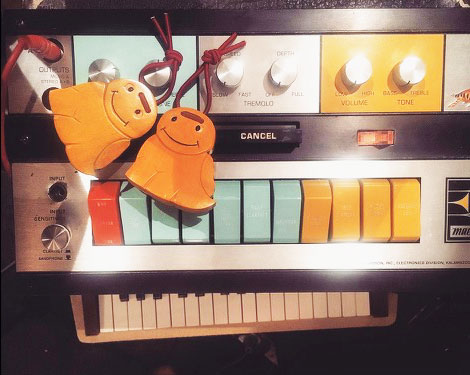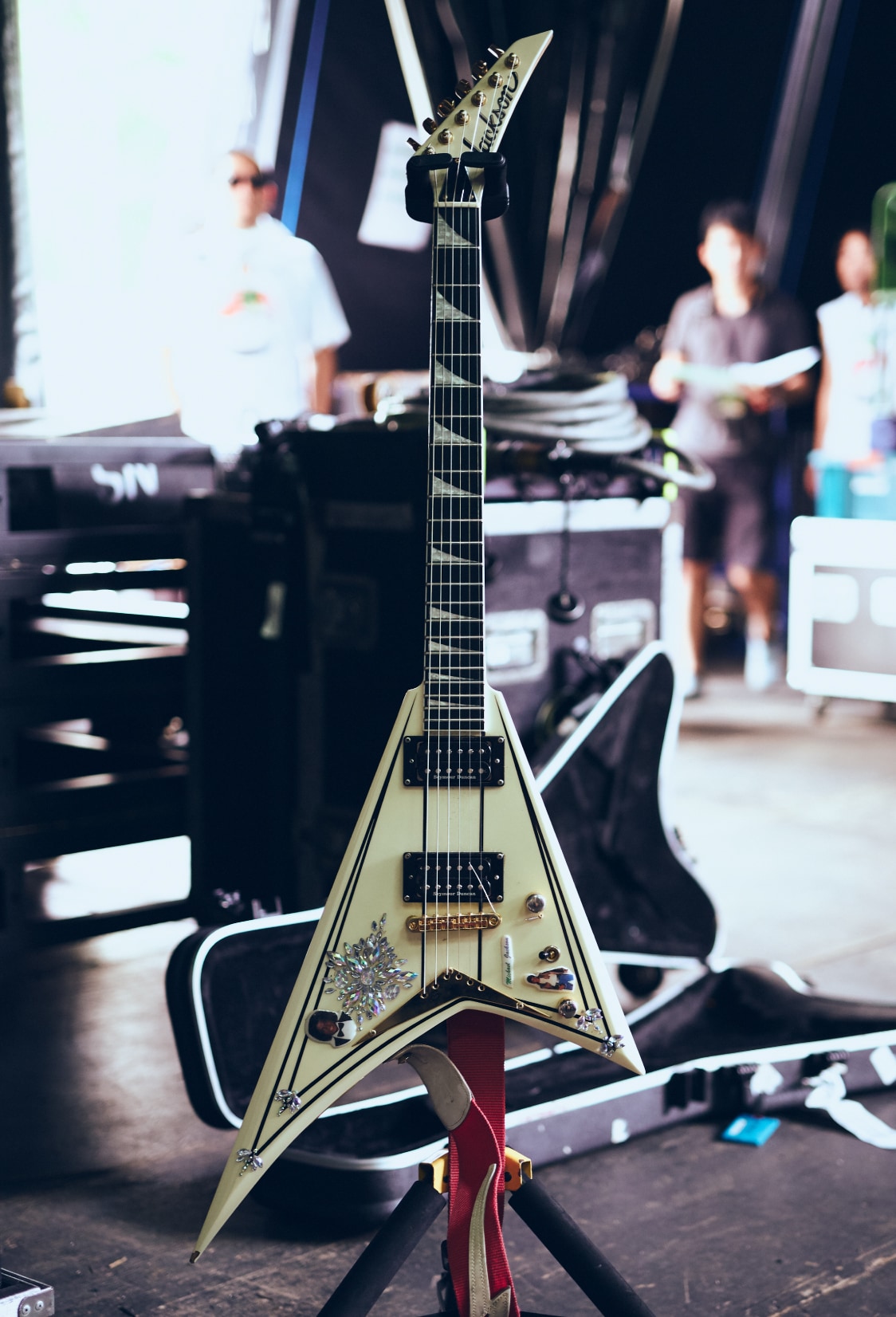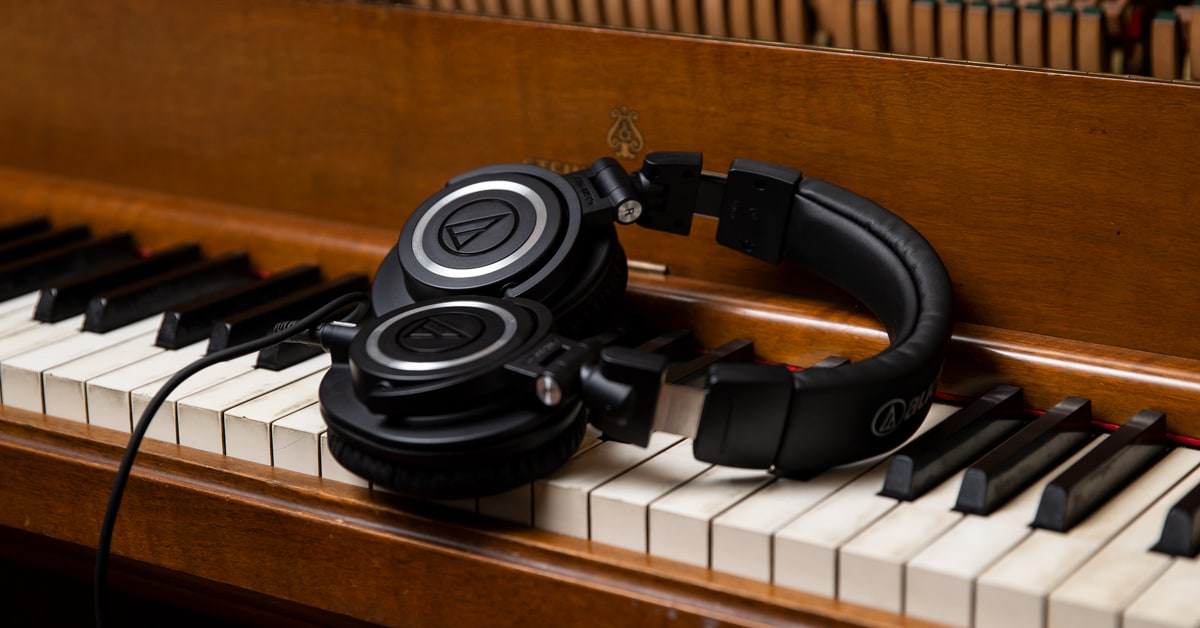Melbourne, Australia-based Hiatus Kaiyote is a band that's near impossible to categorize, because, as vocalist/guitarist Nai Palm says, "Beauty is in the evolution." That evolution across the span of three full-length releases and several EPs since the band's founding in 2011, is more than evident. Bouncing from neo soul and hip-hop to folk/world music influences and dreamy trance overlays, all topped off with Nai's ethereal vocals, each recording has been distinctly different, but always rooted in the group's immediate psyche and circumstances. It's that directness and honesty that keeps them fresh. "There [are] people that have never gone through what I've specifically gone through," says Nai, "but empathy is universal. Music is a direct way to translate that, and it can connect us."
That connection, Nai feels, is inherently a part of music. "Our empathic reaction to sound is in the very fabric of nature," she says. "And what's so interesting about music, and why it's so rewarding for the people that go on the journey of exploring it, is you're essentially tapping into something greater than you, but that's also very personal and intimate." The commitment to the universality of both the musical and human experience has gained the band an audience that's as eclectic as their records, ranging from metal fans and classical buffs to ground-breaking hip-hop artists like Kendrick Lamar, Drake and Anderson .Paak who have sampled their work. If the creative experience is a circuit that connects us all, Hiatus Kaiyote has thrown that switch.
We had a chance to chat, cross- continent via Zoom, with Nai and bassist Paul Bender about how they collaborate and get inspiration from each other's solo projects. In the wide-ranging conversation, they also touched on their connection to their broad fan base, connections with ancient musical traditions, and how making music helps weave all of that into a beautiful human tapestry. Oh, and we talked about gear, too.
How did you start working together?
Paul Bender: I saw Nai playing a solo gig and I straight-up harassed her to be in a band with me pretty much.
Nai Palm: Well, it scared the shit out of me. I always wanted to get a band together, but the songs I write aren't typical progressions. I don't have any music theory. I knew it was something I always wanted to do, but I didn’t have the cerebral language to explain the complexities of what I was naturally making. When I met Bender, he got it, and he was like, "Whatever you need. I want to facilitate it and chord chart it out and help you bridge that gap." The ironic thing is even though Simon (Mavin, keys) and Bender both [have] extensive music theory knowledge, so much of the band's chemistry is just intuitive and listening to each other anyway. Bender gave me a business card, and then I chickened out because I thought, "Oh, my God. It's so serious and scary." Then I think I ran into him at a jam party. So we all met progressively through [things like] that.
What about your other band members?
Nai: Pez, aka Perrin Moss, plays drums, but does a lot of amazing production. If you check out his solo stuff, you'll see what I mean. In a live context, he plays drums, but in the studio, it's more production and detail-oriented things. Actually, he didn’t consider himself a drummer when we first started. He just taught himself how to drum for sampling, and from a production standpoint. He was quite unsure of himself as a drummer when we started. But the thing that's another testament to our chemistry is that it just made sense. He has such a unique approach. So many musicians that are super traditional or world-class musicians who have played with all the icons revere him, because he has this raw originality that you can't teach someone. I think it comes [from] approaching as a producer rather than, “I'm just gonna hold down the beat.”
Bender: There's Simon Mavin, aka Snake Hips, on the keys. And he is a master virtuoso on the keys, and master of pulling interesting, weird tones, and finding cool instruments. He's the gear hunter, and he's the writer of many magical, magical etudes.
Did you work at developing collaboration skills?
Nai: I think it's because we've been playing together for 10 years. It's natural. It's like with anything—the more familiar you become with something, the more fluid it is. Whenever you're learning a new skill or whatever, the more you practice it or the more familiar you are, the better you are at it. I guess an example would be, say, you're learning Arabic, and you're doing all your lessons, and you got some phrases, but most people really blossom into being fluent when they go somewhere where that's the only language that's being spoken. I think it's like a four-part collaboration where we've all been exploring and working together over a long period of time, so it's only natural that you kind of got cheat codes. I think at the core of it, we trust each other more. In a creative project, you're constantly trimming the fat of ego, and you think, "Why do I have my heart set on this idea, and why am I so stubborn about this?" The more you trust what the other people are bringing to it, the less battle there is, so it just kind of weaves together more efficiently. Beauty is in evolution. So we strive to kind of always have that hunger to create together.
Can you give us an example?
Bender: I think one of my favorite things on the last record [editor’s note: Mood Valiant], was just when we were recording in a barn and had this repurposed water tank that had been concreted out and turned into an echo chamber. We had a microphone that was being shot into that and shot into a space echo and just going into multiple things which was the basis for "Sparkle Tape Break Up." We just did a cool thing with the sound that stimulated your imagination, and then Nai ended up just doing takes of basically being this weird Elven child. It's always interesting when you have a microphone that's doing something weird and you kind of react to it. And then it's just like, "Whoa, what it sounds like in my headphones when I do this," and then she just really went for it. I thought "What is she doing right now? It's really weird. Don’t stop her from doing this. This is really good."
Nai: I guess it's in relation to how our solo projects influence our collective sound, and that everybody writes. Everybody can write different pieces and then bring it to the table, and we expand on it. So sometimes, I'll have full songs. For example, "Get Sun" was actually really old, and I thought it was pretty shit, and I showed the guys, and they were like, “What are you talking about? This is great.” And then we ended up—I think it was another reason for getting Arthur Verocai to do the orchestral arrangement because it was such an old song. It's different for every song—some things are super old, and some things we just make up. So there's no real formula. Everyone can bring whatever. Even if you've got this much of a song, we bring it together and expand on it, and then we've got whole songs. Which has kind of always been our process. There's no one solid writer. We're all writers.
How accepting have your fans been of the range of your music?
Bender: I think we have a very open-minded fan base. I think we definitely did ourselves a favor by making our first album [eclectic]—it set the benchmark and the expectation, and that's what we're about. There was no restrictive box for us to break out of because we kind of just broke out of it immediately. And that's what people really liked about Tawk Tomahawk, and it's kind of what they expect from us now. They think, "Oh, they're just gonna do a whole bunch of different stuff." I feel like if you want to be doing a whole lot of a different stuff, then you should just do a whole load of different stuff. That's how you get a fan base that expects you to do a whole lot of different stuff.
Nai: I think that’s the amazing thing about our fan base—it's kind of like a little sampler of different morsels of styles, our fan base isn't one demographic. Whenever we play a show, you look out in the audience, and it's people that wouldn’t usually hang out together all in one room, and it's really cool. We have metalhead fans. We have hip-hop fans. We have classical fans, and it's because our fan base is a reflection of that eclectic composition of our work. Maybe not everyone's gonna love everything, but if someone likes something or can take something positive away from one thing, then it's cool. Then you've done what you need to do. It's cool that it can bring together different listeners from different worlds.
Let's talk gear for a moment, because it's kind of expected. What are your touring rigs, and what's some of your all-around favorite gear?
Bender: The bass that I tour with is an Ernie Ball Bongo bass—a really funny-looking bass, which is why I put stickers all over it because it's really comical. Weirdly enough, it's a collaboration between Ernie Ball and BMW which is fucking hilarious. You'd think they'd come out with something that looks a bit more stylish, but I feel like it has a bumper car aesthetic. It's a cool bass, so I don't know. Out of all the six-strings I've picked up, I think it's probably the one that sounds the juiciest and meatiest. I think it's just that thing of the whole six-string thing can be a bit naff, but I was trying to expand the range that I have to play with because we're always trying to cover a lot of ground with what each of us is playing, and it's very helpful if I actually have more notes that I can reach for. I play through Ampeg SVTs mostly when I'm touring, and I pretty much always use Ernie Ball Slinkys which are great. When I'm in the studio, I play a whole bunch of different basses. It's usually a tune-to-tune thing. Sometimes, it's a section-by-section thing. There's definitely songs where I played multiple basses that'll be in different parts of the song just because they do very different things. Like, in “Chivalry Is Not Dead,” I'll play a Gretsch Electromatic in the verses and outro and bridge and stuff. But then in the chorus and the slap part, I play a Kiesel bass, which is super modern and pointy on the slap part, and then I just find a polar opposite kind of thing.
What about other effects?
Bender: I got a few choice bits. The DigiTech Whammy 5 is great. I use that a lot. Box of Rock distortion is—use that a bunch. I got that [Electro-Harmonix] POG thing, which I don't use all the capabilities of that much. But the main thing I usually use it for is it the fact it's got a little envelope thing in it, which is what I use for "All the Words We Don't Say" on the kind of weird, low-attack volume envelope. Originally, I was doing that with literally a volume pedal, so every note, I was just pumping the volume pedal for an entire song. Like, wah, wah, wah, while my foot was just going the whole time. This is not the way. So, it turns out that pedal does that very well.
Nai: There's this effects unit that Simon has that’s blue and orange and it looks super '70s or something.
Bender: Is this weird? It's called a Maestro Woodwind Effects. You plug an external sound into it, and it kind of is like a really old-school synth pedal that was designed for woodwind players. I'm pretty sure [Joe Zawinul] used something like that in Weather Report at times and stuff. It sounds really crazy on the bass. It's really wild. I was listening to a Frank Zappa record a month or something ago, and I heard the sax player playing some crazy effect like that, and I was pretty sure that's what it would've been. The Maestro Woodwind Effects. It's a very cool unit. Actually tracks really well.

Nai: We love things to sound like they're a tape that's been melted in the sun on your dashboard.
Paul Bender: Yeah. It's very evocative. I'm looking for ways to degrade the sound in an interesting way because it's more distinctive and evocative than just things sounding clean and normal and natural. What is natural? It's an emotional thing that it has to do rather than just be, like—there's music out there where you warp the thing you're trying to present—the reality of exactly what's in front of you—but sometimes you kind of evoke something that's beyond that. So that’s definitely a big part of the process is how you try and evoke something that feels maybe dreamy or like a memory, or that it's from a different place and a different thing.
Nai, what about your live rig?
Nai: I used hollowbodies for a long time. I had an Ibanez Artstar which I love, but it's really heavy. And, because I have tiny hands, I need things to have a really low action, and I find that I'm more likely to write if it feels easier to play. From the get-go, I always wanted to play electric guitar because I just hated if you're a woman and you play guitar, it has to be an acoustic, and there's a lot of prejudice there. And, when I'm doing live solo shows, it just gives you this power. Then, Lianne La Havas—she's an amazing singer/songwriter—called me up, and it was her birthday. She was in Costa Rica and she said, "Oh, my God. It's my birthday. Come to Costa Rica." I was at a music store, and I had to leave the room I was in because there's [a lot of] people playing and trying [stuff] out. So I went to a place where it was quiet, which just happened to be where all the metal guitars were, just to talk to her, because I was on FaceTime. I said, "Oh, I might just try that." She's like, "Yeah. You should try that," and she gassed me up. And initially, it was just because it looked cool. I'm superficial like that. I thought, "I'm gonna try this pointy one." But then when I played it, it was just so effortless to play and so light. And it also—because it's designed for shredding, so it's designed for efficiency, but also because you can either get a really clean sound or you can get a really dirty sound, and I like that you can kind of find a combination between the two, and it works. So I went off with it. And my little brothers were there, and they're saying, "Yeah, you should do it," just randomly. It was my first guitar I ever bought, actually—my first guitar was a gift. The second guitar was given to me, and then my first one was this Jackson Rhoads. Kind of sad we didn't have the whammy bar though, because I've recently so fallen deeply in love with whammy bars, and some of the Jackson models have it, but not this one.

What about amps and pedals?
Nai: My favorite amp, I can't tour with because it's so delicate. It's a Golden Tone Valve Amp which was made by an Australian company, and it's so beautiful. It's kind of reminiscent to Erkin Koray, who's this sick Turkish psych-rock guy. I love surf guitar tone, or really warm but dry. It's velvety but dry. It's not ideal for touring, but I used it on the Tiny Desk performance, and I use it in the studio. In a live context, I usually use a Fender Twin or a Hot Rod Deville or Deluxe just because they're just pretty solid. And pedal-wise, off the top of my head, there's a POG—is it the same as yours, Bender?
Bender: Yeah, the one with all the sliders on it. You can put it one or two octaves down and one or two octaves up in various amounts, and it's cool.
Nai: It's kind of like this crazy harmonics thing that makes it sound like cutlery in a microwave or something, which I really love. Whenever I wanted to sound a bit weird, I'd have that on. I've also got an octave pedal—by which I mean a lot of them. So there's an octave one which is really great when I'm performing solo live. I put a sub octave on my guitar just to give it a bit more presence. It just makes it juicier. Especially because sometimes my solo shows will be in front of 1,500 people—which doesn’t sound like that many people, but when it's just you and a guitar, it's a lot. It's a lot to command with just a guitar. So I kind of like to juice it up a little bit with that. And I've got a delay pedal, and there's one that kind of works like a chorus suspension.
Bender: Oh, the Uni-Vibe.
You mentioned how your different solo projects affect your collaborations. Can you expand on that?
Bender: I'm in the process of getting the vinyl pressed for a new solo record. This is my first foray into doing basically a vocal album, which is a very sincere, heartbreak kind of record called How to Forget, and that's gonna be coming out hopefully at the end of November, 2021.
Nai: Where he recorded it is amazing.
Bender: I recorded all of it in this crazy man-made cave tunnel thing down in Tasmania. So it's just all this amazing natural reverb, and I played all the instruments on it, guitar, bass, cello, double bass, percussion and vocals. I feel like I have something to say about the thing, so it's just an album. An album came out. I'm really, really proud of it. It's just good to have the ability to have an idea about something that you want to express and just feel like, "I'm gonna do that." It's not something that I've necessarily done before, but that's the whole point, really—try to break into new territory, you know? Once you've broken into new territory, it opens up.
Nai: It doesn’t come from wanting to be the best at something. It's just like, how am I feeling now? And everyone has that confidence in their chest to just try it out.
Bender: It's just a personal need to express something. And then you get to have the experience of learning a whole bunch of stuff while you're doing it. It's not about—I don’t care with my solo stuff, how many people it's important to. It just comes from a place of, “I really feel like doing this.” And that's the whole point of music—is, “I feel like expressing this.” I don’t care how many people listen to it. I just feel like doing it. [There] was a thing that Rick Rubin said that I really liked—if there's some sort of music that everyone's okay with, then it's very unlikely that it's anyone's favorite thing. Something that is significant to someone is inherently divisive. Someone's favorite thing means that it's someone else's least favorite thing. If it's just okay with everybody, then it's just okay to everybody.
Back to gear for a second—what did you use for that kind of remote session?
Bender: It's down in Tassie [Tasmania]. So, I took down a little bit of stuff. I borrowed a few things. I mainly used a Stellavox mixer, RCA ribbon mic, a couple of pencil condensers down in the tunnel, and a few other little bits and pieces. Just one guitar amp that I would play things through. Not heaps of different stuff. Just a variety of guitars and basses and the main instrument was the whole space itself, really, and my voice. The Stellavox was the key piece. They're really great, beautiful Swiss machines.
Nai, can you talk a bit about your solo release and why you choose to make an acoustic album?
Nai: I guess I kind of like to break down the stereotypes of singer/songwriter with a guitar where it's, like, an acoustic, it would be classified as an acoustic album, but there's still so much you can do with that. We had a year off from Hiatus because everyone was just fried from touring, and it was really important for us to love each other and be inspired to work together. I think a lot of bands burn out because you're just on this wheel of shows and record and press and all this stuff, and to make healthy art, you need healthy spirits and minds. So, we had a year off, and I always thought I would do an acoustic record, but it just kind of happened. I'm thinking, "What am I gonna do? I don't need a year off. I always have to be creating." Our label offered me the opportunity to do it, and I wanted to kind of just focus on some new stuff. There are some covers, and I wanted to focus on vocal harmony and arrangements, and how something can still have a lot of life just with guitar and voice. So there is so much you can do with that, and I think also I wanted to celebrate the fact that the first thing—whether or not people consider themselves singers, it's such a primal thing and it's such an empathic thing—it's the first thing that everyone does when they're born is make sound from their face. And so it's a celebration of that.
It seems as if you also dug into traditional Australian Aboriginal culture for this. Can you talk about that connection?
Nai: I was really fortunate to work with this Aboriginal ceremony man, and his name is Jason Guranbal Guruwiwi, and he lives on a community on the very top of Australia, and he doesn’t really do shows. He's a ceremony man, so if there's a funeral or a corroboree [a traditional gathering or dance] or some kind of rite of passage, he's the singer for that. I did an event, he was on the bill, and I heard him sing. The thing about this song that a lot of people don't realize is it's thousands of years old, and they're called "song lines," and basically, they walk in the country, and they sing. And, as they walk, different parts of the song relate to different places in the land. When we were recording it, he was just going and going. I just thought he was doing takes, and it was like, "How much of the story do you want?" I didn’t realize that the song goes for three weeks. It was just getting further and further in because it's like a traveling song. Basically, the song line is a snake that's like a creation snake, and it's the guardian of water, and the part that I used on the record was when the snake sings lightning. And so when I first saw him perform, it just grabs you by the soul. It's so raw and so ancient, and there's no ego. There's no stylization. It's like culture. And I was just bawling my eyes out watching him sing, and I thought, "I have to share this with people because I'm really blessed that I get exposed to this, but a lot of people don't know." So, I hit him up, and he agreed to do it. It didn’t have to be a song line. I said, "You can just sing anything," and he trusted me with this song that's been in his family for thousands of years. It's the first song you hear and the last song you hear on the album. Initially, I scared the shit out of my label. I'm said, "I'm gonna start it with this song line." It's very isolating to my listeners, but it was intentional to say, "Listen to this. It's rare, and it's beautiful, and it should be celebrated." So that was kind of the icing on the whole record.

Can you elaborate on that concept of a song line?
Nai: Aboriginal Australians are the oldest living culture in the world, and they don't even know how far back it goes. It's, like, 70,000 years plus. So this song is passed down from generation to generation, kind of like griot music in Africa. It's something that is passed down through generations, and it's an oral history, and there's just such a power in that. Jason's like a language custodian because there's a lot of different languages and communities, and he's like a translator. So he has custodial rights to this song. And there's a lot of red tape when it comes to indigenous languages because there was no book where it's like, well, this is right, and this is the person. It's living and breathing. Basically, indigenous communities globally are the most oppressed, and there's so many injustices that happen globally. I feel like that can only continue to exist if people don't know, or if people are unaware. That's not necessarily anyone's fault, but I just thought it would be beautiful. Rather than being political about it, it's just showing people. It's like look how beautiful this is. Isn't that beautiful and ancient and healing? And it makes people engage.
How do you feel that kind of combined experience helps music bring us together?
Nai: It's everything. It's the fabric of the universe. I don't know. There's something super magical about music. I'm reading a book. There's this Sufi poet called Rumi who was from [what's now] Afghanistan, but a couple hundred years ago. In his poetry, he's often talking about the divine. He's a philosopher and he's very deep but often, as a metaphor, he will use music because it is essentially like a divine force. And everybody can engage with it in some way or another. I have met people that say, "Yeah, I don't really listen to music." But it's like—what kind of sociopath are you? Sound is so universal. The first sound you hear is your mother's heartbeat. Our empathic reaction to sound is in the very fabric of nature. What's so interesting about music, and why it's so rewarding for the people that go on the journey of exploring it, is that you're essentially tapping into something greater than you, but that's also very personal and intimate. It connects people. I could write about something deeply personal, like Bender's breakup album. There are people that have never gone through what I've specifically gone through, but empathy is universal. And music is a direct way to translate that, and it can connect us. And purely just from my experience of listening to music, and how healing it is to people writing to me from the other side of the world who have a completely different life to me that are saying things like, "This meant this to me because this." I feel like that's really powerful. And it's so powerful that it's political. Human expression is almost political. John Lennon, for example, was on the CIA's most wanted list because he released the single "Give Peace a Chance" during the Vietnam War. [It's] just a song, but it's powerful because it connects people. That's the beauty in it—and that's why I adore working with the guys—having that sanctuary to just live and interact with something bigger than myself.
I want to add on that before we move on. Say you only listen to rock—hetero white rock. That's all you listen to. Even that. Even the purest form of music has been influenced by a completely different genre somewhere along the line. Rock comes from blues, and then you listen to Saharan blues from Algeria and the Sahara, and there's a thread through everything, and you might think that you're a purist and you're the thing that you like musically, but the thing I adore most about art is it does bridge those gaps. And even people who say, "I'm only about this one thing," it's like, well, if you break down the origins of that one thing you're about, it comes from so many other things. Kind of celebrate that intentionally.
Keep up with Hiatus Kaiyote.










